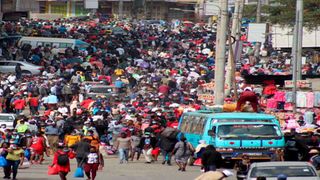
Traders go about their business at Gikomba Market in Nairobi on June 20, 2021, some without face masks worn to curb the spread of Covid-19 and while disregarding the social distancing requirement.
| Lucy Wanjiru | Nation Media GroupNews
Premium
Covid-19 cases soar as Kenyans throw caution to the wind
What you need to know:
- When the first wave peaked in July last year, the positivity rate was only 9.4 per cent, but this time it’s significantly higher.
The delta variant of Covid-19 is spreading fast in the country, leading to a spike in infections in the last two weeks as experts warn that Kenyans seem to have thrown caution to the wind.
The last seven days have seen an average increase in positivity rate by three per cent as it moved to 13.8 per cent from 10.3 per cent last week.
When the first wave peaked in July last year, the positivity rate was only 9.4 per cent, but this time it’s significantly higher.
The Kenya Medical Research Institute (Kemri) alludes the increase in infection in the third wave to the new delta variant, compared to the alpha and beta types.
“The third wave affects both social groups, rural and urban counties, and it’s not explained by increased movements. It’s best explained by the introduction of more transmissible variants,” Kemri said in a study.
Experts have urged authorities to go back to basics and enforce public health measures. The acting Director of Medical Services, Dr Andrew Mulwa, said there is Covid-19 fatigue among Kenyans and called for re-messaging on the need for caution.
“Kenyans seem to have forgotten that we are still in the middle of a pandemic and we are far from being out of the woods,” he said.
Public relaxed
Dr Nelly Yatich, an epidemiologist, said the “relaxed atmosphere” among Kenyans in the face of a new variant is worrying.
“The high positivity rate is because the delta variant spreads easily and because of that, more people are likely to get infected and hospitalised,” she said. “When the admissions go up, the healthcare system will be overwhelmed and deaths as a result of Covid-19 will also rise.”
As of Thursday, the Covid-19 death rate was about two per cent. Dr Yatich said more people should be vaccinated to prevent severe outcomes of the disease.
She warned that increased political activities were working against efforts by the Health ministry to contain the spread of the disease.
“With all these political rallies going on, the leaders are clearly not leading by example. We have been given public health measures that we need to adhere to and one of those is the ban of public gatherings, yet our leaders are at the forefront of these rallies,” said Dr Yatich.
With schools re-opening, there is need for vigilance since the new variant affects children though they are not eligible for vaccines.
“It has been reported that the delta variant affects younger people as well and are now showing symptoms,” she said.
Government’s role
World Health Organization African regional director, Dr Moeti Matshidiso, said governments need to invest and ensure there are no super-spreader events in schools.
“Each country should look at its own situation on the increased rate of Covid-19 cases and factor in the children because they can easily bring back the disease at home from school,” she said. “It is a balancing act that all governments should weigh carefully.”
A Kemri policy brief says there has been an 80 per cent increase in transmission per contact as from the end of January, which could be explained by a more transmissible variant.
Data from the ministry shows that as of July 26, the local transmission rate was 83 per cent, meaning most of the positive cases are internal. Just about 17 per cent of the positive cases were imported.





